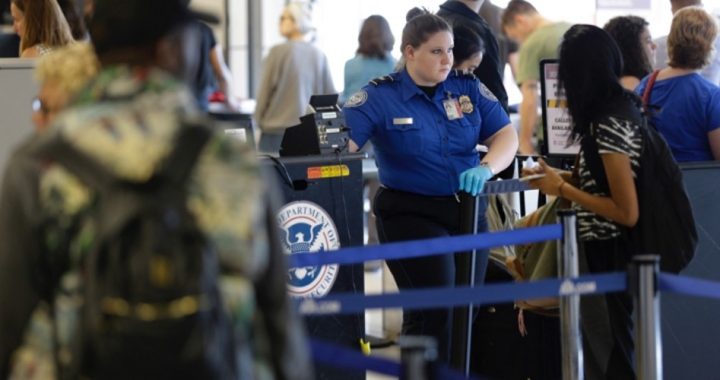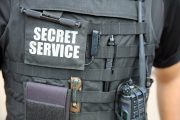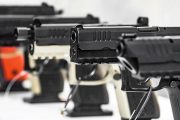
Just when you thought the Transportation Security Administration’s (TSA) passenger-screening procedures couldn’t get any worse, they did. As of Thursday, the agency is now conducting “comprehensive” pat-downs on all passengers who require pat-downs.
Up to now, TSA agents have been able to choose among five different types of pat-downs depending on their assessment of the risk posed by each passenger. As of March 2, however, they have had only one choice, which TSA spokesman Bruce Anderson told Bloomberg is more “comprehensive” than previous pat-downs. A TSA statement reported by Chicago’s WLS says the new procedure “does not involve any different areas of the body than were screened in the previous standard pat-down procedure” — cold comfort given that the previous procedure already involved all parts of the body, including the breasts, buttocks, and genitals.
“I would say people who in the past would have gotten a pat-down that wasn’t involved will notice that the [new] pat-down is more involved,” said Anderson.
One passenger who noticed was Joel Stratte-McClure, a travel writer from Redding, California, who blogged about his experience with the new procedure. Departing from Redding Municipal Airport on his way to Egypt, Stratte-McClure was subjected to a pat-down, which he said is normal because of the “permanent gold bracelet” he wears on his wrist. According to Stratte-McClure, the TSA agent who performed the search — one of “14 agents for fewer than five departing flights a day” — told him he was “not going to like the new pat-down regulations,” and indeed he didn’t, referring to it on Twitter as “groin scrutiny.” (Other Twitter users were even blunter, calling it “legalized groping.”)
When Stratte-McClure asked the agent his opinion of the new procedure, the agent, in Stratte-McClure’s telling, expressed his own dislike of it and explained, “They’ve discovered that bad people conceal weapons in their pants and we’ve got to do more extensive vertical and horizontal pat downs.”
The TSA largely “discovered” this in 2015 when it flunked nearly 96 percent of tests carried out by Department of Homeland Security (DHS) undercover agents, who managed to smuggle phony bombs and banned weapons onto flights despite the TSA’s supposedly rigorous screening procedures. Almost two years later, the agency is responding to the DHS inspector general’s report on the tests with the new, “comprehensive” pat-down procedure.
TSA public-affairs manager Nico Melendez told the Redding Record Searchlight there’s another reason for the new policy: It “lessens the cognitive burden for our officers.” That may well be necessary considering that one needn’t have so much as a high-school diploma to get a job as a TSA screener, but it’s hardly reassuring.
Roughly two million people pass through the TSA’s airport checkpoints each day. Those who refuse to go through the agency’s imaging scanners are automatically subjected to pat-downs. Others may be selected for pat-downs “as part of our unpredictable security measures,” according to the TSA’s statement.
Clearly, more people are going to be subjected to longer searches under the new rule, yet the TSA says it doesn’t expect an increase in overall security delays. However, WLS noted, “some passengers are not convinced.”
“They’re not gonna have enough individuals to do the pat-downs and we are gonna miss flights and they’re not very concerned when you do miss a flight,” traveler Laura Contreras-Ortiz told the television station.
Passengers aren’t the only ones who will have to suffer delays and humiliations from the new pat-downs. Airport employees, airline pilots, and flight attendants will also be subjected to random body searches — searches that Denver International Airport told employees and flight crews “may involve an officer making more intimate contact than before,” reported Bloomberg. Pilots and flight attendants had been able to undergo expedited security checks since 2010, thanks to pressure from the pilots’ union. Airport employees have been subject to random checks since the TSA’s inception, but they may face more of them now.
An already-dreaded part of air travel has thus become that much more unbearable, yet many Americans are prepared to accept it. “Security is very important so do whatever is necessary to have a safe flight,” traveler Judy Powell told WLS.
But does the new procedure really make flying safer? TSA critics have for years decried the agency’s efforts as “security theater,” giving the appearance of security without actually providing it.
Stratte-McClure, who told NBC News he had undergone “the most intriguing, intense and invasive pat down I’ve had by the TSA since they came into existence,” also “doubted that the new pat-downs would be much more effective than the old ones, which he said didn’t work in the first place.”
Twitter user JE Gallagher, the associate executive producer of the No Agenda podcast, tweeted that the TSA’s latest move is “pure theater to groom Americans to accept tyranny,” asking, “When was the last [time] they [the TSA] prevented a terrorist plot?”
Truth be told, the TSA doesn’t have to foil terrorists. In fact, a successful plot on the TSA’s watch would probably only lead to more funding for the agency — as government failures usually do — and even less freedom for travelers. The TSA merely has to make it look like it’s doing something to protect flights — while reducing the “cognitive burden” on its agents, of course.
Photo: AP Images



